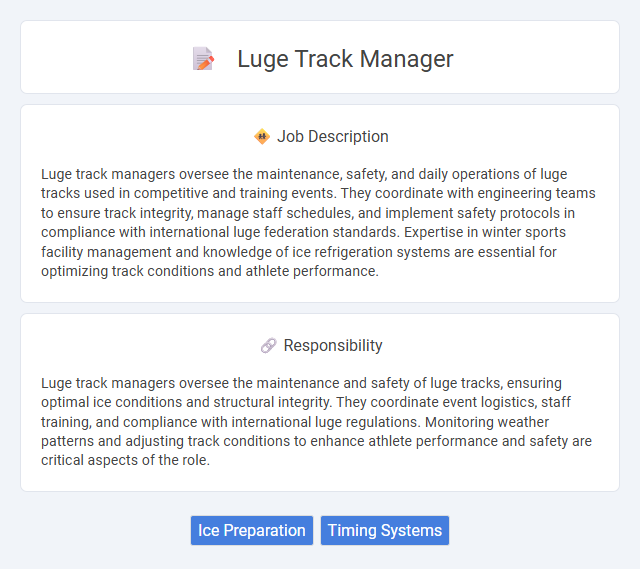
Luge track managers oversee the maintenance, safety, and daily operations of luge tracks used in competitive and training events. They coordinate with engineering teams to ensure track integrity, manage staff schedules, and implement safety protocols in compliance with international luge federation standards. Expertise in winter sports facility management and knowledge of ice refrigeration systems are essential for optimizing track conditions and athlete performance.
People who thrive as Luge track managers are likely those with strong attention to detail and the ability to stay calm under pressure, as the role demands constant monitoring of track conditions and ensuring safety protocols are followed. Individuals with a background in sports management or engineering may find themselves particularly suitable, given the technical knowledge required to maintain the track's integrity and handle emergency situations. It is probable that those who enjoy dynamic environments and possess excellent communication skills would adapt well to this position, coordinating with athletes and support staff effectively.
Qualification
A Luge track manager requires strong expertise in sports facility management, including knowledge of ice track maintenance and safety protocols. Proven skills in team leadership, event coordination, and risk assessment are essential for ensuring smooth operations and athlete safety. Relevant certifications in sports management or technical training in ice track systems enhance the candidate's qualification for this role.
Responsibility
Luge track managers oversee the maintenance and safety of luge tracks, ensuring optimal ice conditions and structural integrity. They coordinate event logistics, staff training, and compliance with international luge regulations. Monitoring weather patterns and adjusting track conditions to enhance athlete performance and safety are critical aspects of the role.
Benefit
The Luge Track Manager likely enjoys benefits such as competitive salary packages and opportunities for career advancement within the sports management industry. Health insurance and retirement plans might also be part of the compensation, enhancing overall job security and satisfaction. Work environment perks, including access to premium sporting events and networking opportunities, could further contribute to professional growth and personal fulfillment.
Challenge
Managing a luge track likely involves overcoming significant challenges related to maintaining safety standards and ensuring optimal track conditions under varying weather scenarios. The job probably demands quick decision-making and coordination with technical teams to adapt the track for training and competition schedules. High-pressure situations may arise frequently, requiring strong problem-solving skills and resilience.
Career Advancement
A Luge Track Manager oversees daily operations, maintenance, and safety protocols for competitive luge tracks, ensuring optimal conditions for athletes and events. Expertise in facility management, technical knowledge of track systems, and leadership skills enable progression to senior roles such as regional director or national federation positions. Continuous professional development and certifications in sports management enhance opportunities for career advancement within the winter sports industry.
Key Terms
Ice Preparation
Luge track managers specialize in precise ice preparation to ensure optimal track conditions for high-speed sledding events. They meticulously monitor temperature, humidity, and ice thickness, using specialized tools to maintain a smooth and safe racing surface. Expert knowledge of ice physics and weather patterns is essential to adjust the track environment for consistent performance and athlete safety.
Timing Systems
A Luge track manager specializing in timing systems oversees the installation, calibration, and maintenance of precise electronic timing equipment crucial for accurately measuring athletes' run times. This role demands expertise in advanced sensor technology, software integration, and real-time data analysis to ensure reliable performance metrics during competitions. Proficiency in troubleshooting timing hardware and coordinating with event officials guarantees seamless timing operations critical for fair and official race results.
 kuljobs.com
kuljobs.com